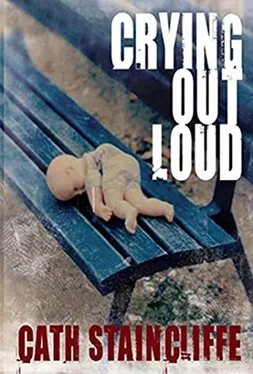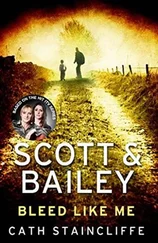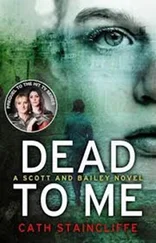‘About three,’ she said.
‘Did he reply?’
‘No.’
My heart skipped a beat. ‘Would he usually?’ I asked.
Her voice changed: a thread of foreboding in it. ‘Yes, mostly. Why?’
‘I don’t have all the answers yet, Libby.’ There were still gaps, contradictions, puzzles.
‘But you have some? I need to know.’ She sounded intent.
‘As soon as it’s clearer, I’ll ring you back. I promise.’
Everything Libby had told me supported the emerging theory I had. Charlie got to the cottage much earlier that November afternoon. In daylight. Much earlier than everyone had been led to believe. He had time to hang up his coat, bring in his toolkit, set the central heating to come on so the place would be warming up when Libby arrived. Then he was killed. Someone took his car and hours later, masquerading as Charlie, drove back to the cottage to make it look like Charlie was still alive. Creating an alibi for his wife Heather. Heather Carter must have known the car that they were following was not being driven by Charlie. Then who? Whichever way I threw the dice I got the same answer staring at me. Who else could that be but Alex? Something I’d already been told was impossible. Unless…
There was one final word of confirmation I needed but it meant speaking to Valerie Mayhew again.
‘Just one more question, please,’ I spoke in a rush, pleaded with her, gripping the phone, ‘then I won’t bother you again.’
‘No. Enough’s enough. And I’ve told Heather to have nothing more to do with you. I’m not prepared to countenance-’
I hurried on, ignoring the acid in her tone. ‘Did you see Alex as soon as you got back to the house? Did you actually see him then or only later?’
The pause stretched out. I swallowed, the muscles in my back were stiff, my belly clenched with tension.
‘Mrs Mayhew?’
‘I could hear him. Heather went up to see him. He was still on his games.’
‘And he came down later for tea?’
‘Yes,’ she agreed.
‘What about Charlie? Did you see Charlie at the house when you first called for Heather?’
She didn’t say anything. I felt a jolt of excitement, a flip in my stomach. I was right. ‘Did you see Charlie?’
‘What are you getting at?’ Again she could not confirm it. I wasn’t losing my marbles, I was on the right track.
I thought of Heather, the grieving widow. Her plausible performance when I’d first seen her after she’d had the letter from Chloe. And Alex, a typical shy teenager. One who’d had to bear the trauma of his dad’s death.
‘I think Alex drove the car,’ I said. ‘I think Charlie was already dead by then.’ And you were a patsy, set up to seal their alibis. I didn’t say that last bit out loud.
‘This is ridiculous,’ said Valerie. ‘You’re making a big mistake.’ But there was more uncertainty than conviction behind her words.
Heather or Alex had killed Charlie, then both of them had been involved in the cover-up. Heather constructed the fake scenario of getting Valerie to help her trail her errant husband, Alex had driven Charlie’s car to the cottage, creating a false alibi and using Valerie to seal the deal. Was Heather the killer? She was losing her husband to another woman. Sexual jealousy is a very powerful emotion. Perhaps she had got wind that Charlie was breaking his promise and sneaking off to see Libby. Perhaps she’d even been told the lie about Charlie going to the NEC for the weekend and seen through it, regurgitating it later for Valerie and the police. Or was Alex the one who killed Charlie? Possibly spurred on by his mother’s distress. Had he been the one with the knife? My mind was cycling, stuck tracing a Mobius strip, trying to grasp the full picture.
The phone rang again. Had Valerie thought of something else? ‘Hello?’ I said.
‘This is Heather Carter.’
The back of my neck prickled and I felt my stomach drop.
‘Valerie rang me earlier.’ Her voice was soft, troubled. ‘She said you were asking questions about us, about Alex and me.’
I didn’t confirm or deny it, just sat it out waiting to see what she wanted.
‘I’d like a chance to talk to you, to try and clear things up.’
As if it was a little minor misunderstanding; something that could be ironed out, fixed by a little civilized discussion.
‘You can talk to me now,’ I told her.
‘Not over the phone,’ she said.
Was it a trap? There was no way I was going round to her place. If Heather had done what I thought she’d done then she would be desperate to stop the news getting out. That thought was followed swiftly by another: if Heather tried to hurt me it would be obvious to the whole world whodunnit and she’d be inviting arrest. She’d be stupid to try anything – and her ability to evade detection, presumably to think fast and smart under enormous pressure, to protect Alex and herself and persuade the policy of their innocence, showed she was far from stupid.
Nevertheless, I exercised caution. I wouldn’t invite her into my space either but meet her somewhere neutral. Somewhere busy, in public where we could talk without people listening.
‘Albert Square,’ I told her. ‘Outside the town hall, half past two.’
She thanked me and hung up.
I’d a sick feeling of apprehension about meeting Heather but it was tempered by a keen curiosity. My chest felt tight and my throat dry and I shivered, chilly even though I had the heating on.
Heather Carter was there before me; I saw her get to her feet from the bench where she was sitting and I raised an arm in acknowledgement. That hurt. I was still having to move gingerly to try and minimize the pain from Dryden’s attack on me.
The storm had moved on by mid-morning and now the day was fine: wisps of cloud in a china-blue sky, the sun slanting across the cobbled square, caressing the honey-coloured stone of the town hall with golden light, everything washed clean by the rain.
As I’d hoped, the place was busy with people: office workers on late lunches eating sandwiches or smoking, a large party of oriental tourists, maybe Japanese or Chinese, following a tour guide over to the fountain at the far side of the square.
Heather and I had the bench to ourselves. Her forehead was furrowed with concern; I could see the tension in her shoulders, huddled as though she was cold in spite of the roll-neck sweater and brown suede jacket she wore.
I waited for her to speak, nervous myself, feeling faintly nauseous, but intrigued as to how she would play it.
‘These…’ She faltered, began again, her fingers worrying at each other. ‘The things you’ve been implying – that we might have lied. I don’t know how you’ve come up with that idea but it’s a horrible mistake. I want to set things right.’
I didn’t believe her, not for one second. If she and Alex were innocent, she’d not have given me the time of day. She’d more likely have gone to the police herself, to complain, and would never have invited me to meet with her. She was on a fishing trip, I thought, to see how much I knew, see how big a threat I was.
‘You’re wasting my time. I didn’t come here to be fed more lies.’ I got to my feet, ignoring the stab of pain in my calves.
‘Please wait,’ she said quickly. ‘It’s not what you think.’
I sat back down carefully. ‘One of you killed Charlie,’ I said quietly, ‘then you covered it up.’
‘No,’ she insisted.
Across the square a man stepped into a taxi and the cab pulled away; the line of black taxis moved up the rank. A flock of pigeons rose and circled the square. A woman was taking photographs of the marble statue of Oliver Heywood, raised to the benefactor for his devotion to the public good.
Читать дальше












